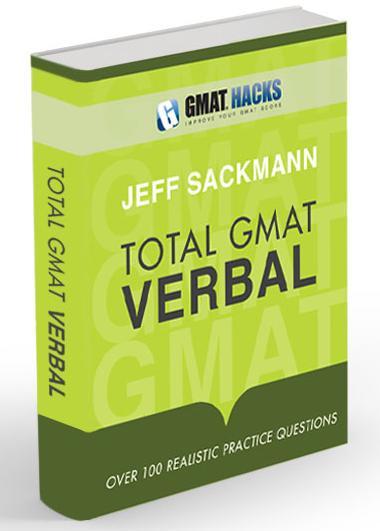
Bookshelf
|
|
Total GMAT Math Jeff's complete Quant guide, on sale now! |
|
|
Total GMAT Verbal Everything you need to ace GMAT Verbal! |
1,800 Practice Math Questions
Buy Jeff's books at Amazon.com

GMAT Official Guide, with IR
OG Math | OG Verbal
OG12 & Quant Rev solutions!
GMAT Question of the Day
Beginner's Guide to the GMAT
GMAT Hacks Affiliate Program

Recent Hacks

Categories
- General Study Tips
- Goals and Planning
- CAT Strategy
- The Mental Game
- GMAT Math Strategy
- GMAT Math Topics
- Mental Math
- Data Sufficiency
- Critical Reasoning
- Reading Comprehension
- Sentence Correction
- Analytical Writing Assessment
- Integrated Reasoning
- IR Explained
- Business School Admissions
- GMAT Prep Resources
- Practice Questions
- Total GMAT Math
- Total GMAT Verbal
- GMAT 111

GMAT Study Schedule
| You should follow me on Twitter. While you're at it, take a moment to subscribe to GMAT Hacks via RSS or Email. |
Everybody's different, but there are some aspects of studying for the GMAT that seem to be similar for most people. Nothing I write will keep some people from trying to cram all of their GMAT studying into one week, but I hope I can help the rest of you better arrange your preparation time.
The Big Picture
The most challenging aspect of studying for the GMAT, for many people, is fitting it in with the rest of your life. It's important that you devise a study schedule that doesn't deprive you of sleep, or make unreasonable (or even impossible) demands on you. Such a plan isn't going to work. I've seen people try.
I generally recommend that people study for approximately 12-15 hours per week. It's important that you do some of that every day, and if you absolutely must miss a day, don't miss more than two in a row. Even if that means stealing 20 minutes at lunch to do a few math problems, that's much better than skipping the day entirely.
Those 12-15 hours work best if you do 1 to 1.5 hours per day during your workweek, then 5-10 hours on the weekend. Few people are able to productively study for the GMAT for more than 2 hours or so at a sitting, so break up that time on weekends. Two 2-hour stretches, or perhaps three 1.5-hour sessions, is the way to go.
How Many Weeks?
Most of the major test-prep companies offer classes that take 6-8 weeks. There are condensed courses that require only 3-4 weeks, but most of the students I taught in courses like that couldn't keep up with the homework, and weren't as successful.
Combining that with my own experience working with students one-on-one, 8 weeks seems to be the optimal length of time. If you're a naturally good test-taker and have a lot of time on your hands, you may not need that much. If you have a lot of remedial math work to do just to catch up, you may need more like 10-12 weeks.
However, more than 10 weeks--12 on the outside--is too much. The law of diminishing returns sets in, and you increasingly run the risk of burnout. Further, you run out of materials. You can prepare for the GMAT impeccably by only using official GMAC material such as The Official Guide combined with my Total GMAT Math, but if you work for 5 or 6 months, you're going to have a hard time finding equally effective study materials for that length of time. That's a big reason for the diminishing returns.
How To Spend Study Time
I've written in detail about how to maximize your study time, by extensively reviewing and re-doing problems as necessary.
Unless you're naturally brilliant at math and are only intending on studying to improve your verbal score, it's important that you work on some math at least every other day. The more ground you have to cover in Quant, the more frequently you should study it.
There's no need to mix up Problem Solving and Data Sufficiency in a single day, but it is important not to ignore any question type for too long. Too many students ignore verbal altogether for weeks, then wonder why their Criticial Reasoning skills have suffered in the meantime.
As a general rule, aim to do some math 3-4 times per week, including some PS and some DS. Also plan on doing at least a few questions of each verbal type (Critical Reasoning, Reading Comprehension, and Sentence Correction) every week. This way each one of the skills you're developing stays fresh.
Follow a schedule like that for 6-8 weeks, and you'll be much better prepared than the majority of people taking the GMAT. Not only that, you'll have studied that much more efficiently, and you can approach the exam more confidently because of it.
About the author: Jeff Sackmann has written many GMAT preparation books, including the popular Total GMAT Math, Total GMAT Verbal, and GMAT 111. He has also created explanations for problems in The Official Guide, as well as 1,800 practice GMAT math questions.
 |
Total GMAT Verbal
The comprehensive guide to the GMAT Verbal section. Recognize, dissect, and master every question type
you'll face on the test. Everything you need, all in one place, including 100+ realistic practice questions. |